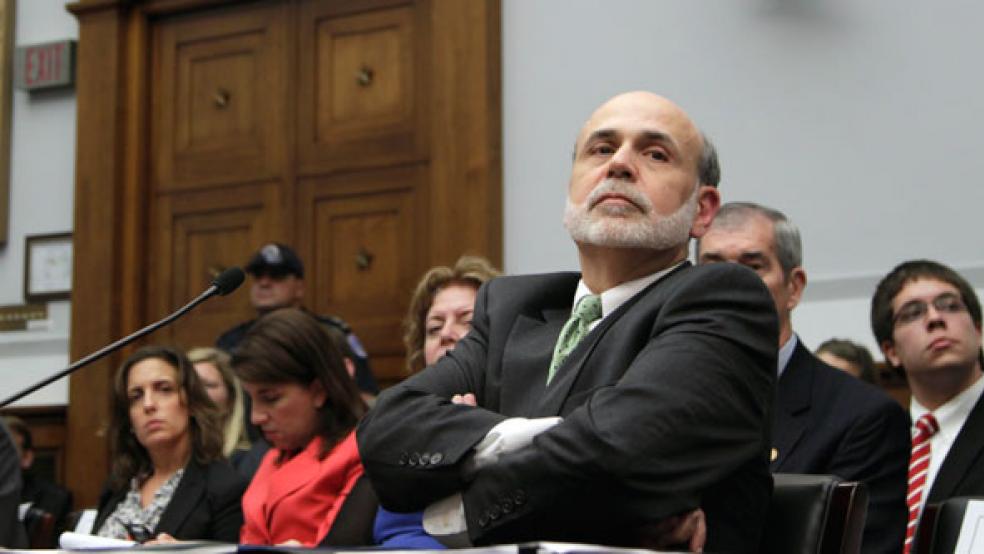Federal Reserve Board chairman Ben Bernanke predicted on Wednesday that the economy would snap out of its current doldrums in the second half of the year even though it continues to face “headwinds” that include the possibility of immediate sharp cuts in federal spending if the White House and Congress fail to raise the debt ceiling.
Budget experts and economists, including former Fed vice chairman Alan S. Blinder, have said that in case of a first-ever default by the Treasury beginning August 2, the government would have to slash spending by as much as 40 percent immediately. And President Obama warned yesterday that he cannot guarantee that retirees will receive their Social Security checks early next month if Democrats and Republicans fail to reach an agreement on reducing the deficit in the coming weeks.
“You need to be a little bit cautious about sharp cuts in the very near term because of the potential impacts on the economic recovery,” Bernanke told members of the House Financial Services committee after his semi-annual report on the state of the economy.
While the Fed is expecting the economy to resume more rapid growth in the months ahead, Bernanke put policymakers on notice that the central bank was prepared to act, perhaps with a third quantitative easing where it buys federal bonds, should economic conditions fail to improve. “The Federal Reserve remains prepared to respond should economic developments indicate that an adjustment in the stance of monetary policy would be appropriate,” he said.
While repeating his long-standing position that Congress should link continued deficit spending to a plan to reduce the nation’s long-term deficit, he refused to take sides in the battle raging across Capitol Hill on whether revenue increases should be part of the mix in any long-term deficit-reduction plan linked to raising the $14.3 trillion debt ceiling. “That’s why they pay you the big bucks,” he told lawmakers.
The Fed chairman’s remarks were unlikely to have much impact on the ongoing talks between President Obama and congressional leaders heading towards the deadline when the Treasury will exhaust its borrowing authority. Without that ability to borrow, the government will lack the revenues to fully fund government operations, meaning it will have to delay payments to seniors, Medicare providers, and government contractors, as well as a temporarily discontinue some government services, according to Obama administration officials.
Recognizing the potential for a default to trigger another market crash and sending the economy into a double-dip recession, some Republicans led by Senate Minority Leader Mitch McConnell, R-Ky., are pushing an alternative that would allow President Obama to lift the debt ceiling without an approving vote from Congress.
The uncertainty surrounding the debt ceiling negotiations clearly has members of Congress edge. The Fed chairman’s remarks were preceded by a testy exchange between House Financial Services Chairman Spencer Bachus, R-Ala., and ranking member Rep. Barney Frank, D-Mass., over the causes of the prolonged economic doldrums.
“The uncertainty and lack of confidence is at the center of the failure of our economy to achieve a robust recovery with job creation,” Bachus said. “The great recession and job losses are contributing factor, but in my opinion, the well-intentioned programs of the 1930s and Lyndon Johnson’s Great Society [are] the historical underpinnings of the entitlement philosophy that have brought our budget to an unsustainable path.”
“I’m surprised you let Woodrow Wilson off the hook,” Frank retorted. “In 2008, we were on the verge of a total economic collapse . . . To say that terrible set of events [were] a contributing factor, but it’s really Lyndon Johnson’s fault is very odd history at best.”
Notably, Bernanke ignored the confidence issue in his prepared remarks, and when pressed later by Rep. Jed Hensarling, R-Tex., to address the issue, he replied: “The business confidence picture is more mixed. Equipment and software investment has actually been quite strong, which suggests firms are not hunkering down completely.”
“They’ve been very slow to hire, in that you’re correct,” he added, but “some of the recent purchasing managers surveys have been positive, but small business confidence is weak.”
In his prepared remarks, Bernanke reiterated the Fed’s analysis that many of the drags that have slowed the economy in the first half of the year are transitory and are abating. Oil and food prices are coming down, the auto sector is picking up sharply after a slowdown caused by the Japanese earthquake and tsunami, and exports and manufacturing continue to be strong spots in the U.S. economy.
The Fed is now projecting economic growth to exceed 3 percent in the second half of the year, 3.3 to 3.7 percent in 2012, and 3.5 to 4.2 percent in 2013, which should be sufficient to bring down the unemployment rate, now at 9.1 percent. “The pace of the economic recovery will pick up in coming quarters,” he said.
Bernanke appeared to be much more concerned about consumer confidence than business confidence. “Much of the slowdown in aggregate demand this year has been centered in the household sector,” he said.
The reduction in the payroll tax approved by Congress last year to try to boost the economy has been largely eaten up by increases in oil and food prices. Moreover, home prices continue to decline, and cuts in government spending and a rising unemployment rate have sapped consumer confidence in the durability of the recovery. On the positive side, Bernanke pointed out that household debt burdens are declining, while credit card, auto loan, and mortgage delinquency rates are all falling for the first time since the onset of the recession.
“The anticipated pickups in economic activity and job creation, together with the expected easing of price pressures, should bolster real household income, confidence, and spending in the medium run,” he said.





